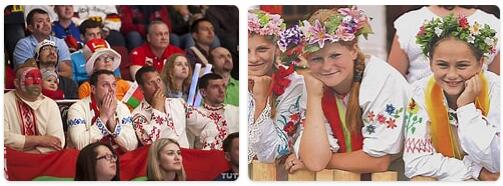
Yearbook 2004
Belarus. The total population in Belarus is 9,449,334 people in 2020. Belarus’s relationship with Russia remained tense during the year. An acute energy crisis occurred when Russia stopped its gas deliveries in the middle of winter, citing Belarus not paying the bills. The Minsk regime believed that the decision had political reasons and that Moscow wanted to take control of the pipeline transporting gas through Belarus to markets in the west. President Aljaksandr Lukashenka reacted very harshly, accusing Russia of “top-level terrorism” by allowing his country to freeze in a 20-degree cold. In February, Belarus succeeded in reaching an agreement on the resumption of Russian gas supplies.
In April, the Council of Europe strongly condemned the situation of human rights in Belarus. The Council accused high-ranking Belarusian government officials of involvement in the disappearance of four people – including opponents of President Lukashenka. The Council called on its Member States to consider sanctions on Belarus. However, the Russian delegation voted against and warned against isolating Lukashenka and thus provoking him into worse actions. Later in the year, four Belarusian officials were banned from entering the EU countries and the US.
During the summer, Belarus closed the Russian television station’s office in Minsk in retaliation for reporting protests against Lukashenka in Minsk. The Belarusian regime had previously tried to stifle the Russian media’s critical monitoring of Belarusian politics.
In the fall, President Lukashenka called for a referendum on a constitutional amendment that would allow him to stand for a third term in 2006. The referendum was held in connection with the parliamentary elections in October, when the opposition virtually disappeared from parliament. According to the Election Commission, the constitutional proposal was supported by over three-quarters of the participants in the referendum. But independent data indicated that less than 50% would have voted yes. Journalists and opposition groups reported on electoral fraud, and the OSCE declared that the referendum had not gone right. The United States reacted to the referendum by imposing financial sanctions. In Minsk, hundreds of opponents of President Lukashenka went out in protest demonstrations, claiming that Lukashenka cheated victory. The police arrested about 30 people.

October
General strike against the regime
October 26
After another Sunday of demonstrations against the presidential election, opponents of the Lukashenko regime begin a general strike, but it has limited support. The opposition, which wants the criticized presidential election on August 9 to be done as, has in vain called on the president to resign, stop the violence against dissidents and release the political prisoners. As usual, a number of participants in Sunday’s demonstration have been arrested.
Human rights prize for Belarusians
22 October
The Sakharov Prize awarded by the European Parliament is awarded to the Belarusian resistance movement against President Lukashenko’s regime. The Human Rights Prize, established in 1988 and named after Soviet regime critic Andrei Sakharov, will be received in the European Parliament on December 16 by Svetlana Tikhanovskaya, a presidential candidate in exile.
Lukashenko visits his prisoners
10 October
President Lukashenko pays a surprise visit to several arrested opposition leaders in the KGB prison security service, officially to discuss his plans to change the constitution. Pictures are published by the President’s Office. The presidential candidate Svetlana Tichanovskaya comments on the meeting by saying that the regime thereby acknowledges that there are political prisoners. She adds that “one cannot hold dialogue in a cell”. The next day, the police use water cannons and stun grenades, restrict mobile internet and arrest several hundred people as the opposition continues its weekend demonstrations against the presidential election.
Russia: Tikhanovskaya wanted
October 7
Svetlana Tichanovskaya, who ran in the Belarusian presidential election in August and claims she won the election, is wanted in Russia. The message is provided by the Russian Interior Ministry, which claims that there are criminal suspicions against her but does not provide details.
Close diplomatic contacts sour
October 2
Belarus is recalling its ambassadors from Lithuania and Poland in dissatisfaction with being subject to sanctions from neighboring countries and other EU countries. Lithuania’s actions in particular have irritated President Lukashenko, as Belarusian opposition presidential candidate Svetlana Tikhanovskaya has been given refuge there. Lithuania and Poland, in turn, call home their ambassadors from Minsk for consultations. A few days later, the Estonian Head of Mission is also called home.
Sanctions against regime representatives
October 2
The EU is imposing sanctions on some 40 people who are being held responsible for electoral fraud in connection with the presidential election in August and for the violence against protesters afterwards. President Lukashenko has so far avoided being on the EU’s sanctions list, but Belarus is reacting angrily and threatening to cut off its diplomatic relations with the EU and abandon joint projects. The United States is announcing similar measures to the EU, while the United Kingdom and Canada have also imposed sanctions on the president personally.
Viasna founders receive award
1 October
Aljaksandr Bjaljatski from Belarus is one of the democracy activists awarded the Swedish Right Livelihood Prize 2020. He founded the regime-critical organization Viasna (“Spring”) in 1996 in protest against how protesters were treated.